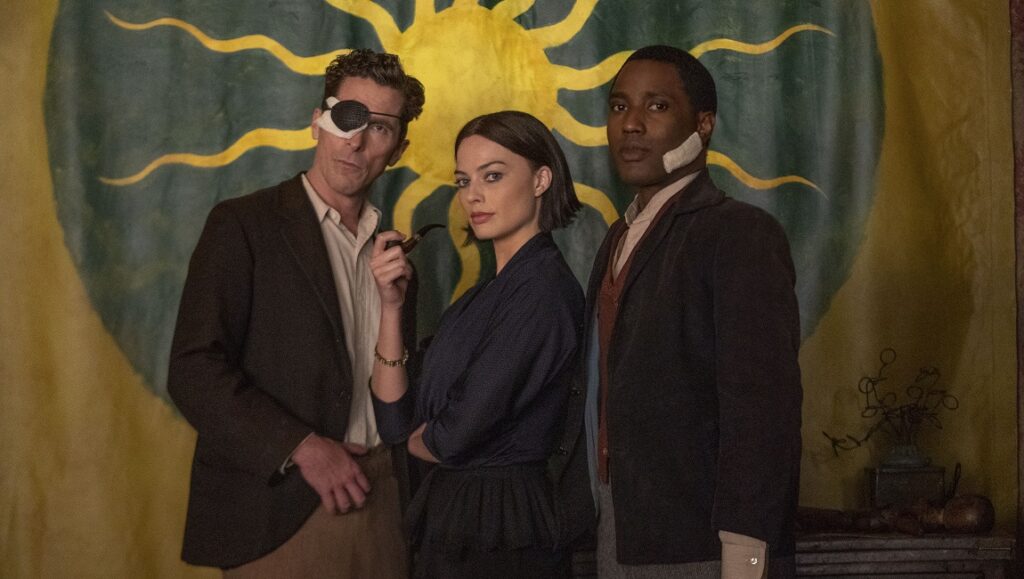Amsterdam is an unredeemable, punchline-less comedy that shamelessly spews the most sickeningly neoliberal messaging of 2022.
The given motto of David O. Russell’s last three credited motion pictures, a loose trilogy of highly prestigious period pieces which found their fabulously wealthy lead thespians cosplaying as members of the working class, is to never say “no.” In layman’s speak, it’s the idea in improv comedy that you have to keep things moving — or at least in a constant state of flux — to authentically capture a feeling of spontaneity. But unlike, say, Russell’s earlier films that captured this sentiment with a frenzied sense of pathos, his later ones’ tendency to always say “yes” has now produced nothing but excessive bloat, scene after scene where two or three over-qualified actors — usually draped in ridiculous five-piece suits, or fitted with a distracting physical modulation like Christian Bale’s hairpiece — screaming at one another in a misguided attempt to find the dramatic “truth” of any given moment. More often than not, the peripheries of these films (whenever Russell can simply chill out for a few minutes) are often far more interesting and engaging than what’s ostensibly happening at their centers. Amsterdam, Russell’s first film in seven years after a winning streak so hot it made everyone forget how much of an abusive asshole he is, takes this notion to its logical conclusion — or, rather, it’s Russell’s first film where its perfunctory elements almost entirely outweigh anything resembling dramatic depth or thematic substance.
Once again, Russell returns to the past to say something about today — which remains the laziest, easiest form of satire imaginable for someone with nothing actually interesting to say about the modern world — linking the rise of fascism during the 1930s to the civil unrest of today’s political climate. This is Russell’s broad call for collective humanism, a rallying cry for everyone to get together and (by the end, quite literally) punch a Nazi in the face. Here, Russell presents us with a worldview where there’s an easy distinction between good and bad, where the evils of the world announce themselves so ostentatiously that all “decent” folks of all different ideologies must unite to stop them. It’s the most sickeningly neoliberal stance for a relatively mainstream movie take in 2022 — with a $55 million budget; no streamer attached, the only sure-fire way to hide an auteur-helmed flop in plain sight these days — and one that would have seemed dated, tacky, and generally out of touch back in 2016. There’s simply no other way to read all of this other than a super guilty guy trying to make the most easily digestible, inoffensive piece of art imaginable. In a sense, mission accomplished: he’s once again got a bunch of famous people to look and act goofy, except this time he’s now forced them to regurgitate trite platitudes about how racism is bad.
For its first hour or so, the film’s ability to skate by on purely superficial charms keeps things moving nicely, but all this also too often resembles tropes from Russell’s previous films. There’s Bale returning to David O.’s domain to play another poorly conceived, martyr-like figure whom the audience is supposed to uncritically adore; John David Washington is here attempting to mimic the same sort of mannered anguish that Bradly Cooper was able to capture with a stronger sense of tenacity; and Margot Robbie is also on board, given a thankless role that Jennifer Lawrence finally had the courage to turn down. Amsterdam largely consists of the trio galivanting around post-WWII Europe — specifically, and predictably, Amsterdam — waxing sweet poetics about peace and kindness, going to dance parlors, and singing nonsense songs (Russell, as it stands, is the current king of the nonsense film). Later on, they’ll solve a murder mystery with no actual sense of mystery, get into a lot of wacky hijinks that aren’t the least bit amusing or entertaining, and get caught up in a political conspiracy that is utterly devoid of suspense. There are so many different convoluted subplots and one-note side-characters being introduced, then quickly disposed of, yet none of it ever amounts to much of anything worthwhile; if anything, the film is impressive in how much it manages to have going on without any of it being of much consequence.
But even when judged from the perspective of light entertainment, Amsterdam still comes up short. Simply put, there are no jokes in this film; there’s never a set-up, only a lot of forced punchlines that come in the form of riffing between the actors. This is a strange approach, considering the film has the pace and rhythm of a screwball comedy, yet the jokes themselves are never suited for that particular mode of comedic filmmaking. The actors try their best, pretending like they’re having a good time, getting in each other’s faces and a little bit rowdy when needed, all running around Emmanuel Lubezki’s technically impressive (though, also at this point, entirely gimmicky) camera movements that are at constant odds with Russell’s musical-like blocking sensibilities. But the last 30 or so minutes, in which Robert De Niro is allowed to indulge in one final bout of Resistance-era kitsch, renders Amsterdam nearly entirely unredeemable as it lurches into a self-congratulatory home stretch that seems to take its audience for complete fools. Russell ends the film by pleading, practically on-his-knees begging, for all of us to get along and work together. As we all know by now, he’s definitely not the most qualified guy to be telling us that.


Comments are closed.